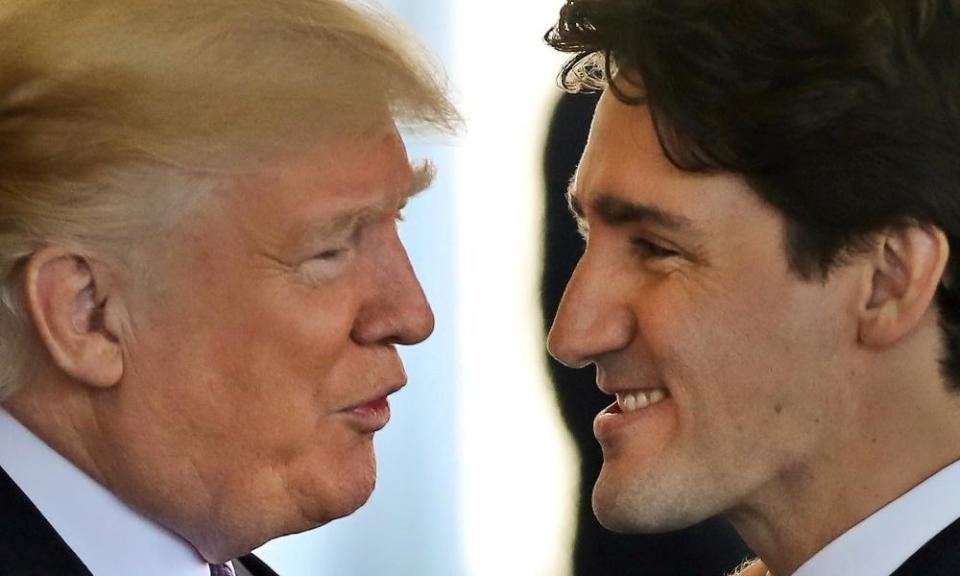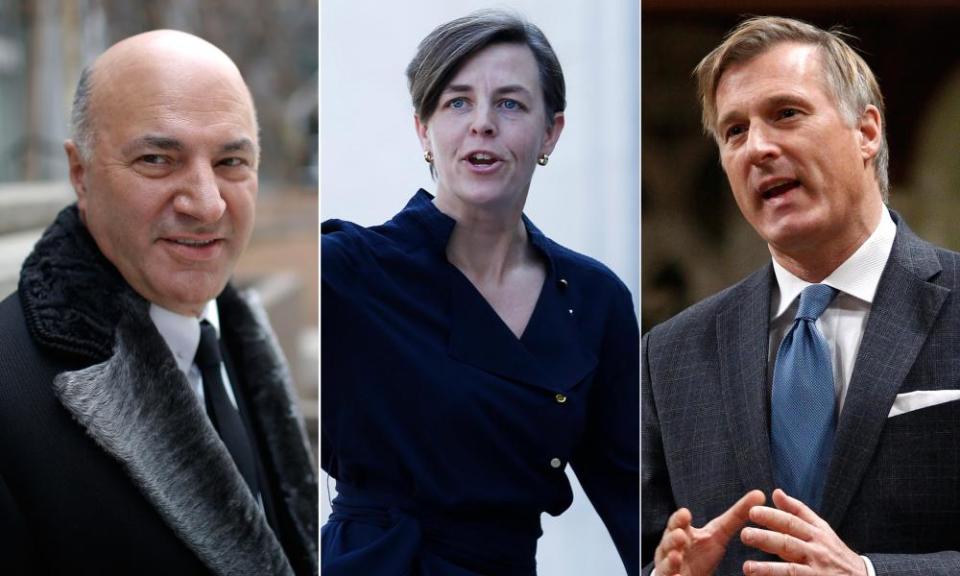Does Canada have its own Donald Trump on the horizon? | Matthew Hays
Right-wing populist candidates in Conservative party’s leadership contest are finding appeal. Canada is not immune to trends upending politics elsewhere

Seeing how Americans perceive Canada is a fascinating spectator sport for Canadians. Long a supporting character in the films of Michael Moore, we have been utopianized as the land with sane gun control, universal healthcare, a more cautious approach to war and no death penalty.
This romance, of course, has only been enhanced given the stark contrast between our two leaders: Justin Trudeau has embraced refugees from the Middle East – even greeting them at the airport as they arrived – and welcomes free trade while talking up environmental protection. It doesn’t hurt that he’s ludicrously photogenic.
Meanwhile, you have Donald Trump, who puts ketchup on his steak and describes tremendous pieces of chocolate cake while misidentifying the country he just bombed.
Given those indicators, both profound and seemingly minor, the adoration of Canada and our leader isn’t hard to fathom. And as nerves are being rattled by what appears to be a rightwing reactionary virus crisscrossing the planet – from Brexit to Le Pen to Erdoğan – it’s easy to see why Canada’s apparent charms are so seductive.
But while I hate to be the bearer of bad tidings, Canada is not immune to the populist appeals of a right-leaning movement – however phony that populism might be.
While Canada’s Conservative party was kicked to the curb in the 2015 election – they won 99 seats in parliament, compared to the victorious Liberals, who won 184 – that outcome was due in no small part to the country’s multiparty system. While it looked like a landslide, the Conservatives won a respectable 31.9% of the popular vote, to the Liberals’ 39.5%. The next election is still a couple of years away, but the Conservatives can hardly be counted out.
Three of the most talked-about Conservative candidates running in their current leadership race (vote to take place on 27 May) appear to be appealing to base populist instincts, which has led to some movement in the polls.
Kellie Leitch, a cabinet member in the former Conservative government, has argued for a Canadian values test for immigrants and refugees applying for Canadian residency and citizenship. While some of her rivals have criticized her for such a stance – suggesting she is appealing to racist fears – she has stuck by this policy idea. Canadian values, she has argued, must be protected.
Kevin O’Leary, who entered the race somewhat late and has been faulted for not speaking French (an extremely important trait for a federal politician, given the country’s official bilingual status), he has all the bluster and bravado of a purported man of the people.
A regular cast member on reality TV shows (formerly Dragon’s Den, now Shark Tank), O’Leary is a businessman who especially loves taking shots at Trudeau, and made headlines last month when he argued the Conservative leadership race was in fact rigged.
O’Leary made some very specific accusations, among them that backroom organizers had used prepaid credit cards to recruit “fake members”. Leitch tweeted her response, that O’Leary was kicking up a fuss “without any evidence. You need to put up or shut up Kevin.”

Maxime Bernier, the most experienced candidate and widely perceived as the frontrunner, issued a public statement calling O’Leary a “loser”. Bernier added: “I’m a winner.” This, coming from the candidate who most closely resembles an adult.
As it turned out, there was some truth to O’Leary’s charges, and that meant the party was forced into an embarrassing acknowledgment and struck 1,351 names off its membership list.
Americans will no doubt be finding this sounds very familiar. The fact is, several candidates in this leadership race are in a giant Trump-off, a panicked rush to see who can appeal to the lowest common denominator of the angriest, most reactionary voters.
It has that strange taste of an Ayn Rand-Jerry Springer cocktail, the one the Republicans were supposed to evolve out of but that somehow worked under Trump, allowing him to take the electoral college.
The other part of this equation is Trudeau himself. While an adept politician who campaigned on “sunny ways”, deficit spending in the name of job creation and economic stimulus, and the legalization of marijuana, some have argued his government is more decorative than substantial – and that Trudeau is better at striking a pose than taking a stand. (He is the target of two rather extreme attacks this week alone, for his stance on the environment as well as what some argue is his generally moribund performance as prime minister.)
During the election, leftist critics charged that Trudeau was doing what the centrist Liberal party has often done to effectively win a majority in parliament: campaign to the left, while then governing to the right when ultimately achieving power.
While Trudeau has championed refugees and is now moving ahead to legalize marijuana, many have expressed anger with his pro-pipeline position, $16bn in arms sales to Saudi Arabia and his abandonment of electoral reform.
His promise of electoral reform – in which Canada’s first-past-the-post system of electing members of parliament would be replaced by something in which voters could use a preferential ballot – was a promise Trudeau had made literally hundreds of times on the campaign trail and repeated in his throne speech upon taking power.
Many suggested the move hit the depths of cynicism in politics, as one of the main reasons the Liberals were abandoning it was that it would clearly make their majority victory far more difficult to repeat.
It is this extreme cynicism in the Liberal party that also dogged the American Democratic party; what many saw as pragmatic triangulation and centrism on Hillary Clinton’s part, others saw as selling out. Thus many didn’t bother to vote, even suggesting – as Susan Sarandon and Ralph Nader appeared to – that it may as well be Trump, or that a vote for Jill Stein (a candidate who had no hope in hell of winning) was a great idea.
The wild card in all of this is the NDP, Canada’s third party, often called the conscience of parliament for their principled stance on a broad range of issues. But principles don’t always make for winning politics, and the farthest they got was when they formed the official opposition under Jack Layton, a wildly charismatic leader who died of cancer not long after savoring the electoral victory. The NDP are currently conducting a leadership race as well.
The other wild card is Trump himself. Canada has often favored a Mama Bear approach to ideology and politics, in part because of our close proximity to the US, where extreme right-wing attitudes, behaviors and policies have, for lack of a better term, freaked us right out.
That Trump’s various solutions and promises have proven so utterly empty so early in his tenure may only undermine those who have attempted to appropriate his bluster and bombast. Canadians may well take note and stick with the centrist they know, rather than the hothead they don’t.

